The United Nations World Food Forum (WFF) took place from 17- 21 October, 2022. Organised by the Food and Agriculture Organisation (FAO), the forum aims to highlight the voices of food and agriculture youth activists from around the world.
It’s the youth of today who will have to deal with the problems of tomorrow. With this in mind, the Department of Agriculture, Food and the Marine organised for a delegation of some of our most inspiring young talent to be sent to the event, where they were able to share their stories and discuss the future of food among peers.
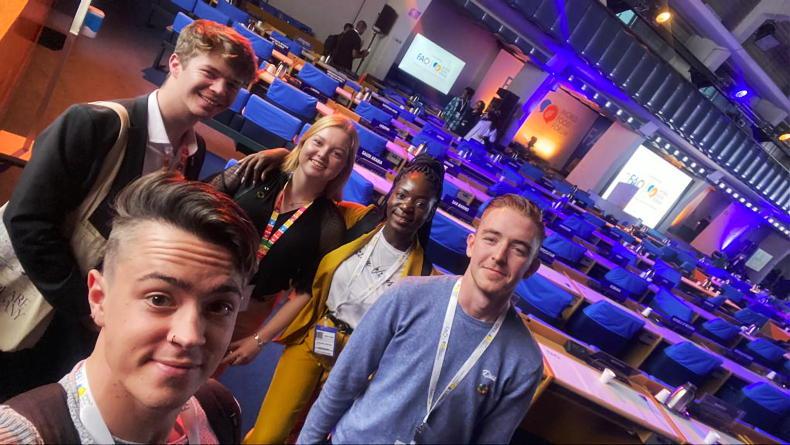
The Irish delegates were chosen because of the excellent work they do in their student, professional and every day lives to promote food system change in Ireland
Minister for Agriculture Charlie McConalogue made a keynote address on the opening day of the forum, where he reinforced Ireland’s commitment to become a world leader in sustainable food production.
Irish Country Living reached out to five members of the Irish delegation to hear their thoughts on the World Food Forum.
Treasa Cadogan
Treasa Cadogan is from Cork’s Cape Clear island. She is the former United Nations Youth Delegate for Ireland (2021/22). Through this role, Treasa was an active member of Ireland’s official delegation to the United Nations for the 66th General Assembly, including attending the Human Rights Council, the 66th Commission on the Status of Women (CSW), COP26 and High Level Political Forum (HLPF) 2022.
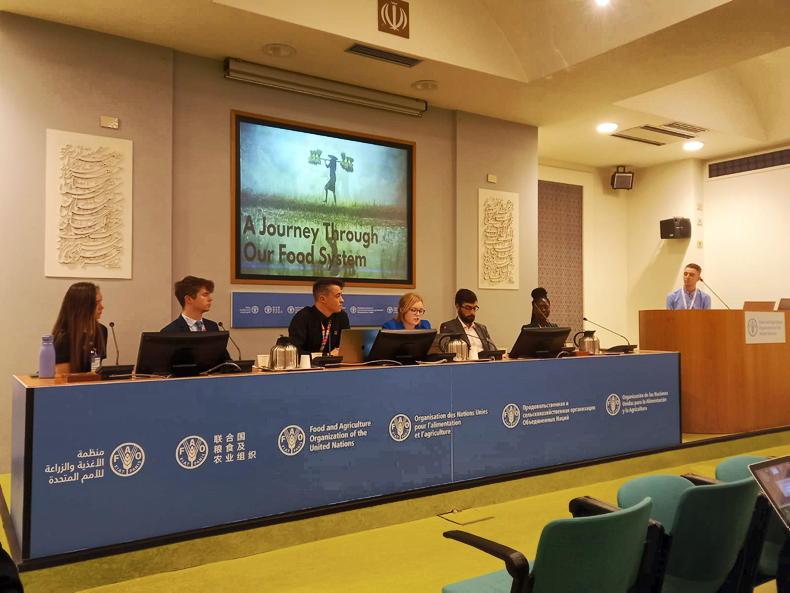
During the forum, delegates had a chance to share their stories about their work in food system change
In July, she was invited by the FAO to speak alongside the UN Food System Co-ordination Hub Director Stefanos Fotiou, the Committee on World Food Security and others in response to the creation of the new UN Food Systems Hub. Treasa is also an elected board member of the Cape Clear Island Development Co-op and, during the pandemic, co-founded the Cape Clear farmers market. She says the World Food Forum was a positive experience.
“[Ireland was] the only country to send an official delegation of young people to the World Food Forum, which demonstrates Ireland’s continued commitment to meaningful youth engagement in the food system transformation,” she tells Irish Country Living.
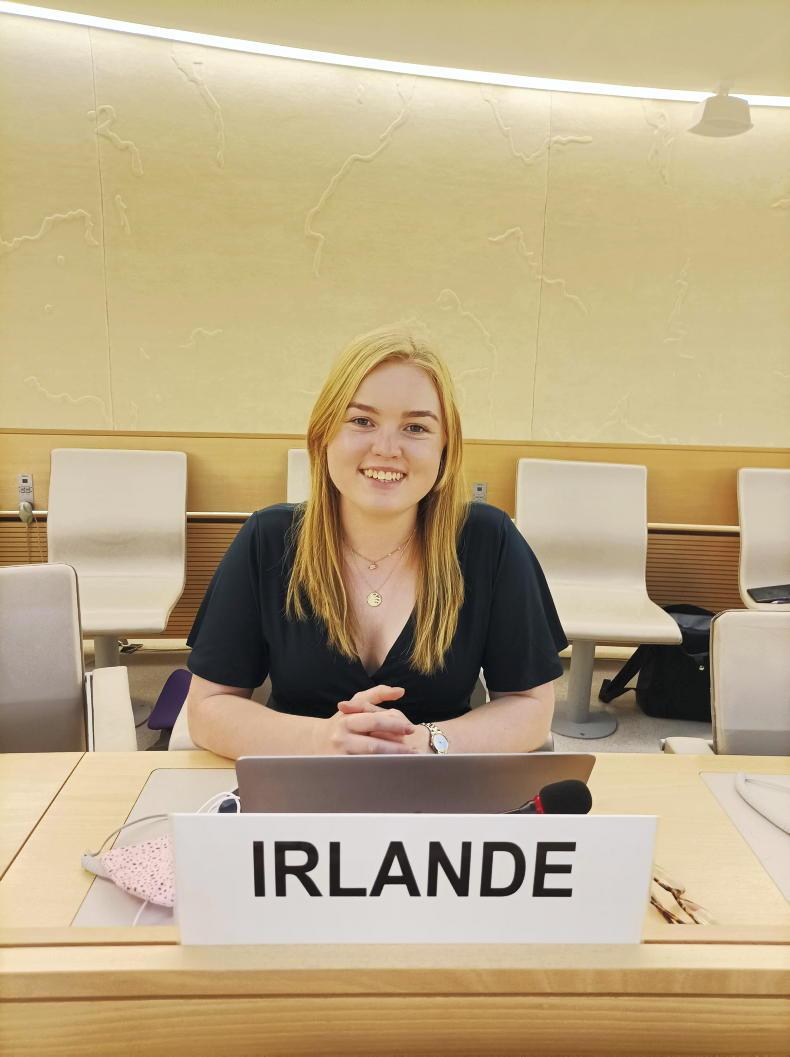
“The week at the World Food Forum and being a member of the official Irish delegation was thrilling and a great opportunity to meet others from across Ireland. I found that, as a member of an official delegation, we were invited to join many bilateral meetings which would have been impossible without the support of the Department of Agriculture,” she continues. “There are many regions that need increased presence at next year’s WFF, as a true food system transformation cannot be achieved without the most vulnerable and underrepresented at the table.”
Treasa says she will continue to focus on this work within her new role in the South Pacific as climate change officer at the UN Fiji Multi-Country Office.
Bertha Kasonde
Bertha Kasonde is a research assistant at the University of Galway. She is currently coordinating the Climate, Food and Farming arm of the Global Research Alliance (CLIFF-GRADS), a flagship programme of the Global Research Alliance (GRA) on Agricultural Greenhouse Gases. She is responsible for sustainable development and communications at the GRA Secretariat.
Originally from Zambia, Bertha holds a Bachelor of Engineering in Environmental Engineering from the Copperbelt University, Zambia, and an MSc in Climate Change, Agriculture and Food Security from the University of Galway. Her research interests include sustainable natural resource management, climate change, urban and rural development, and food systems.
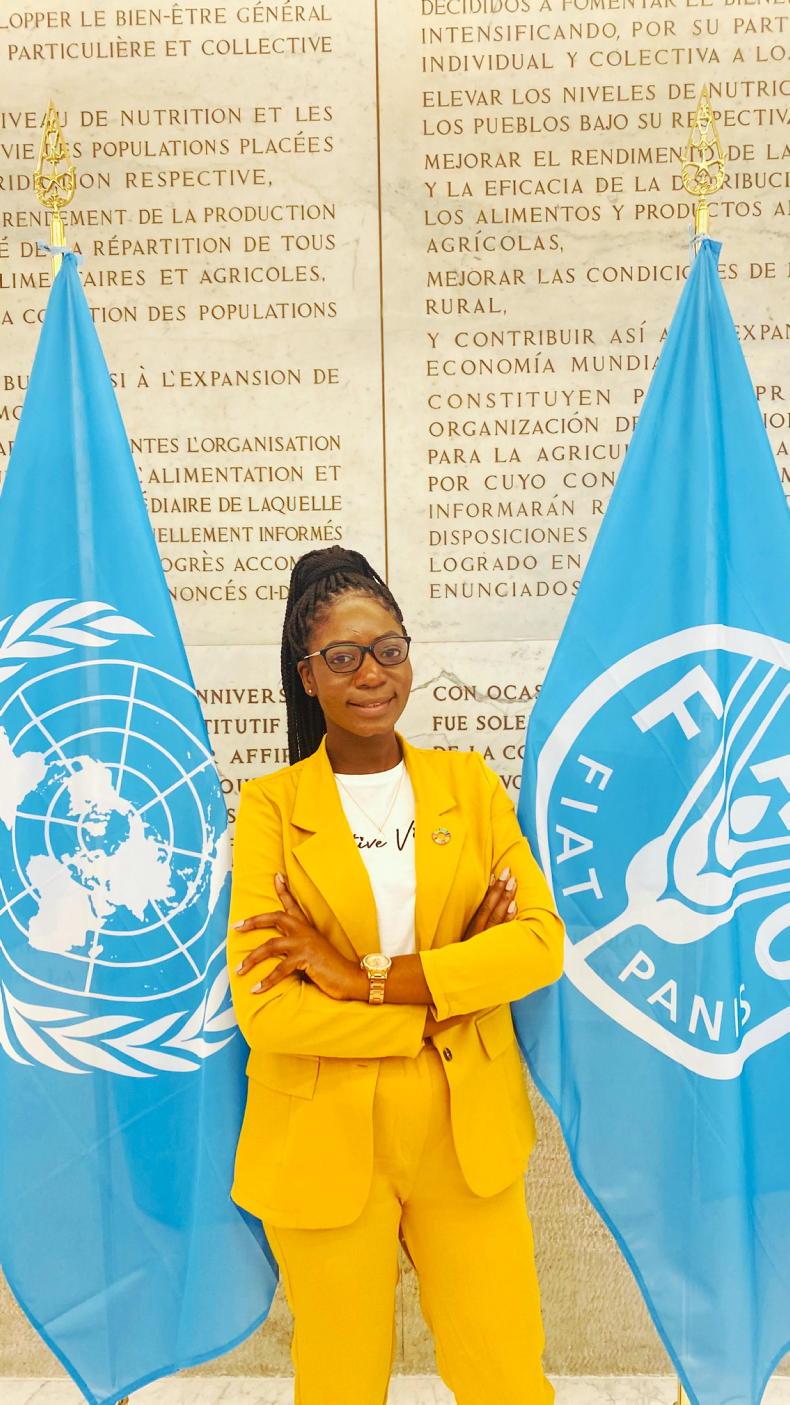
Bertha Kasonde holds a Bachelor of Engineering in Environmental Engineering from the Copperbelt University, Zambia, and an MSc in Climate Change, Agriculture and Food Security from the University of Galway.
Bertha says her involvement in the World Food Forum was life-changing.
“It was a rare privilege and honour to have been in the same room with powerful people from across the globe whose offices are not easily accessed, those who hold financial and political power in driving change – especially in food systems transformation. I was honoured to engage and share the journey of our food systems, the challenges and the future we want as young people. Emphasis was placed on extensive research and innovation coupled with the need to support ambitious and energetic youths taking up careers in agri-food systems.”
Bertha says the forum offered a platform to engage and learn from other young people who are passionate about making a difference in the way we “produce and consume food”.
“The theme ‘healthy diets, healthy planet’ had a powerful message and through various discussions and deliberations, my takeaway is that we cannot operate in silos,” she says. “We need coordinated efforts to tackle the impacts of climate, conflict, population growth and the COVID-19 pandemic on global systems.
“Having been brought up in a farming community in Zambia – whose livelihood solely depended on rain-fed, small-scale farming – I understand the importance of agriculture and the need to address with urgency the current impacts facing our global food systems,” she continues. “Most importantly, young farmers and agri-food businesses need access to resources, intergeneration knowledge sharing and networks to make meaningful food system transformations.”
Thomas Duffy
Thomas is no stranger to the Irish Farmers Journal. He is a Cavan-based dairy farmer, past Macra president and is on the board of The European Council of Young Farmers. He tells Irish Country Living that one of the most essential steps for the future of food is the “inclusion of young people, in both its production and in policy decisions surrounding that production.”
“Attending the World Food Forum at the headquarters of FAO in Rome, it was welcome to see the inclusion of youth voices on the topic of food system change,” he says. “Increasingly, young people are being considered on topics of climate action, however, the very challenges we will face as a result of climate change will be met by the next generation of farmers.
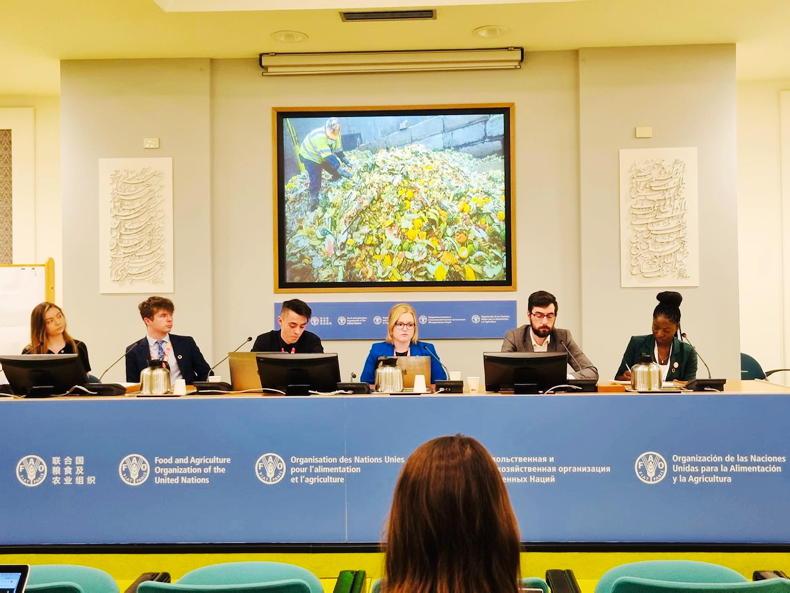
Irish delegates share their stories at the World Food Forum (pictured are Adam Mullins, third from left, Treasa Cadogan, Thomas Duffy and Bertha Kasonde)
“A little like the current ongoing climate conference COP27, [which is] happening in Egypt, the World Food Forum is a place for decision-makers and elected representatives to discuss the future direction of agriculture on a global scale. At times, these discussions may seem distant from everyday production, but discussion around food production will be influenced for decades by these events.
“A key aspect of the discussion that took place in Rome was moving from simple inclusion of youth voices in the conversation to giving those voices a real influence upon the decision-makers,” he adds. “In Ireland, groups like Macra have done so and trained generations of young people to speak to their elected representatives.”
Devin O’Sullivan
Devin is a food provocateur, speaker and author. In 2018, he set up a social enterprise called FEAST to improve food education in Ireland. FEAST has gone on to become a national leader in food education, having visited 100 schools and engaging with 4000 pupils and teachers since its induction. He tells Irish Country Living that it was his work through his social enterprise which earned him his place as a delegate to the World Food Forum.
“Even in a country as small as ours, with a rich heritage of agriculture and food provenance, the rife disconnect between our food and knowing where it comes from has never been greater,” he says. “Food education is key to transforming the global food system and it must be seen by policymakers as a tool for good.”
Devin says the forum was a great platform to discuss the importance of our collective approach to food education in schools.
“When I attend events like this, I always look to see if it is just going to be another photo op/box ticking exercise where politicians gather and pretend to listen to youth,” he says. “Day one seemed to reflect this. Inspirational speakers and leaders in their field gathered in the plenary hall and spoke passionately about the need for change with one youth activist saying, ‘Nothing about us, without us.’ The call fell on only a few deaf ears, as the hall was nearly empty. As the few policymakers returned home, day two onwards saw youth take over, with five days of thought-provoking panel discussions, workshops and think tanks.
“What youth activists are calling for is important, obvious and – above all else – achievable,” he continues. “We urgently need to address the systemic failings of the global food structure to ensure that our future and our children’s future is secure and sustainable. It won’t be achieved overnight; however, with collaboration and support from youth around the world, change can be seen sooner rather than later.”
Adam Mullins
Adam Mullins is a second-year student in NUI Galway. He has created a no-cost food organisation for NUI Galway students called the Galway Student Pantry. He collects short date food items from local supermarkets to alleviate food insecurity among the student body. He has also since established a similar organisation in his home county of Donegal, on the Inishowen peninsula. He says the WFF gave him an amazing platform to discuss the work he does in food.
“I was chosen by the Department of Agriculture, Food and the Marine to represent Ireland as one of its youth delegates at this year’s World Food Forum to discuss the work I do with the Student Pantry, where I redistribute waste produce from supermarkets throughout the city straight to students,” he tells Irish Country Living.
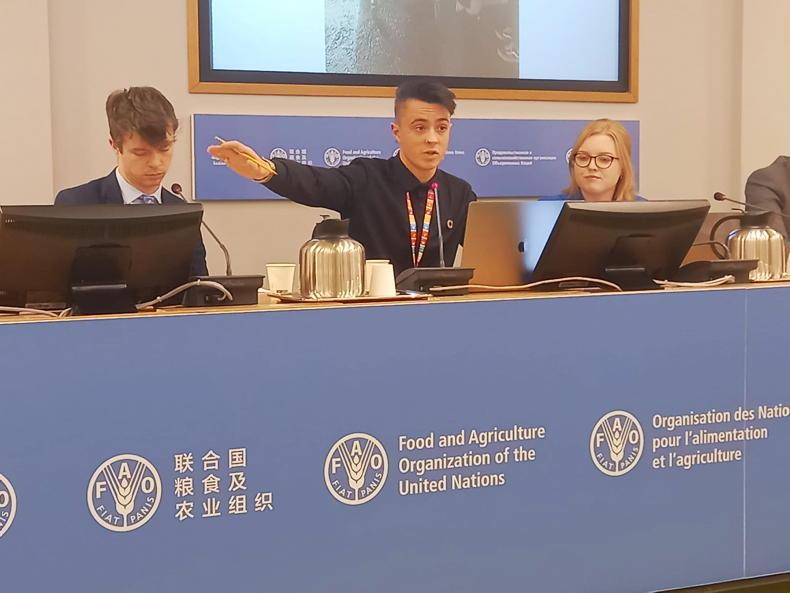
Adam Mullins speaks about his food organisation at NUI Galway called the Galway Student Pantry
“This project started with the goal of giving students the chance to make a more sustainable and environmentally friendly choice when it comes to food.
“The World Food Forum gave me the amazing chance to meet like-minded youth who are passionate about helping to reshape our food systems and work towards a more sustainable society,” he continues. “During the summer when I was unable to keep the pantry open, we redirected the produce to refugee families. In total, over the last eight months, we have supplied over 13,000 meals worth of food.”
Read more
Can we create a food-secure future through gender equality?
Rural Femmes programme empowers rural women through upskilling
The United Nations World Food Forum (WFF) took place from 17- 21 October, 2022. Organised by the Food and Agriculture Organisation (FAO), the forum aims to highlight the voices of food and agriculture youth activists from around the world.
It’s the youth of today who will have to deal with the problems of tomorrow. With this in mind, the Department of Agriculture, Food and the Marine organised for a delegation of some of our most inspiring young talent to be sent to the event, where they were able to share their stories and discuss the future of food among peers.

The Irish delegates were chosen because of the excellent work they do in their student, professional and every day lives to promote food system change in Ireland
Minister for Agriculture Charlie McConalogue made a keynote address on the opening day of the forum, where he reinforced Ireland’s commitment to become a world leader in sustainable food production.
Irish Country Living reached out to five members of the Irish delegation to hear their thoughts on the World Food Forum.
Treasa Cadogan
Treasa Cadogan is from Cork’s Cape Clear island. She is the former United Nations Youth Delegate for Ireland (2021/22). Through this role, Treasa was an active member of Ireland’s official delegation to the United Nations for the 66th General Assembly, including attending the Human Rights Council, the 66th Commission on the Status of Women (CSW), COP26 and High Level Political Forum (HLPF) 2022.

During the forum, delegates had a chance to share their stories about their work in food system change
In July, she was invited by the FAO to speak alongside the UN Food System Co-ordination Hub Director Stefanos Fotiou, the Committee on World Food Security and others in response to the creation of the new UN Food Systems Hub. Treasa is also an elected board member of the Cape Clear Island Development Co-op and, during the pandemic, co-founded the Cape Clear farmers market. She says the World Food Forum was a positive experience.
“[Ireland was] the only country to send an official delegation of young people to the World Food Forum, which demonstrates Ireland’s continued commitment to meaningful youth engagement in the food system transformation,” she tells Irish Country Living.

“The week at the World Food Forum and being a member of the official Irish delegation was thrilling and a great opportunity to meet others from across Ireland. I found that, as a member of an official delegation, we were invited to join many bilateral meetings which would have been impossible without the support of the Department of Agriculture,” she continues. “There are many regions that need increased presence at next year’s WFF, as a true food system transformation cannot be achieved without the most vulnerable and underrepresented at the table.”
Treasa says she will continue to focus on this work within her new role in the South Pacific as climate change officer at the UN Fiji Multi-Country Office.
Bertha Kasonde
Bertha Kasonde is a research assistant at the University of Galway. She is currently coordinating the Climate, Food and Farming arm of the Global Research Alliance (CLIFF-GRADS), a flagship programme of the Global Research Alliance (GRA) on Agricultural Greenhouse Gases. She is responsible for sustainable development and communications at the GRA Secretariat.
Originally from Zambia, Bertha holds a Bachelor of Engineering in Environmental Engineering from the Copperbelt University, Zambia, and an MSc in Climate Change, Agriculture and Food Security from the University of Galway. Her research interests include sustainable natural resource management, climate change, urban and rural development, and food systems.

Bertha Kasonde holds a Bachelor of Engineering in Environmental Engineering from the Copperbelt University, Zambia, and an MSc in Climate Change, Agriculture and Food Security from the University of Galway.
Bertha says her involvement in the World Food Forum was life-changing.
“It was a rare privilege and honour to have been in the same room with powerful people from across the globe whose offices are not easily accessed, those who hold financial and political power in driving change – especially in food systems transformation. I was honoured to engage and share the journey of our food systems, the challenges and the future we want as young people. Emphasis was placed on extensive research and innovation coupled with the need to support ambitious and energetic youths taking up careers in agri-food systems.”
Bertha says the forum offered a platform to engage and learn from other young people who are passionate about making a difference in the way we “produce and consume food”.
“The theme ‘healthy diets, healthy planet’ had a powerful message and through various discussions and deliberations, my takeaway is that we cannot operate in silos,” she says. “We need coordinated efforts to tackle the impacts of climate, conflict, population growth and the COVID-19 pandemic on global systems.
“Having been brought up in a farming community in Zambia – whose livelihood solely depended on rain-fed, small-scale farming – I understand the importance of agriculture and the need to address with urgency the current impacts facing our global food systems,” she continues. “Most importantly, young farmers and agri-food businesses need access to resources, intergeneration knowledge sharing and networks to make meaningful food system transformations.”
Thomas Duffy
Thomas is no stranger to the Irish Farmers Journal. He is a Cavan-based dairy farmer, past Macra president and is on the board of The European Council of Young Farmers. He tells Irish Country Living that one of the most essential steps for the future of food is the “inclusion of young people, in both its production and in policy decisions surrounding that production.”
“Attending the World Food Forum at the headquarters of FAO in Rome, it was welcome to see the inclusion of youth voices on the topic of food system change,” he says. “Increasingly, young people are being considered on topics of climate action, however, the very challenges we will face as a result of climate change will be met by the next generation of farmers.

Irish delegates share their stories at the World Food Forum (pictured are Adam Mullins, third from left, Treasa Cadogan, Thomas Duffy and Bertha Kasonde)
“A little like the current ongoing climate conference COP27, [which is] happening in Egypt, the World Food Forum is a place for decision-makers and elected representatives to discuss the future direction of agriculture on a global scale. At times, these discussions may seem distant from everyday production, but discussion around food production will be influenced for decades by these events.
“A key aspect of the discussion that took place in Rome was moving from simple inclusion of youth voices in the conversation to giving those voices a real influence upon the decision-makers,” he adds. “In Ireland, groups like Macra have done so and trained generations of young people to speak to their elected representatives.”
Devin O’Sullivan
Devin is a food provocateur, speaker and author. In 2018, he set up a social enterprise called FEAST to improve food education in Ireland. FEAST has gone on to become a national leader in food education, having visited 100 schools and engaging with 4000 pupils and teachers since its induction. He tells Irish Country Living that it was his work through his social enterprise which earned him his place as a delegate to the World Food Forum.
“Even in a country as small as ours, with a rich heritage of agriculture and food provenance, the rife disconnect between our food and knowing where it comes from has never been greater,” he says. “Food education is key to transforming the global food system and it must be seen by policymakers as a tool for good.”
Devin says the forum was a great platform to discuss the importance of our collective approach to food education in schools.
“When I attend events like this, I always look to see if it is just going to be another photo op/box ticking exercise where politicians gather and pretend to listen to youth,” he says. “Day one seemed to reflect this. Inspirational speakers and leaders in their field gathered in the plenary hall and spoke passionately about the need for change with one youth activist saying, ‘Nothing about us, without us.’ The call fell on only a few deaf ears, as the hall was nearly empty. As the few policymakers returned home, day two onwards saw youth take over, with five days of thought-provoking panel discussions, workshops and think tanks.
“What youth activists are calling for is important, obvious and – above all else – achievable,” he continues. “We urgently need to address the systemic failings of the global food structure to ensure that our future and our children’s future is secure and sustainable. It won’t be achieved overnight; however, with collaboration and support from youth around the world, change can be seen sooner rather than later.”
Adam Mullins
Adam Mullins is a second-year student in NUI Galway. He has created a no-cost food organisation for NUI Galway students called the Galway Student Pantry. He collects short date food items from local supermarkets to alleviate food insecurity among the student body. He has also since established a similar organisation in his home county of Donegal, on the Inishowen peninsula. He says the WFF gave him an amazing platform to discuss the work he does in food.
“I was chosen by the Department of Agriculture, Food and the Marine to represent Ireland as one of its youth delegates at this year’s World Food Forum to discuss the work I do with the Student Pantry, where I redistribute waste produce from supermarkets throughout the city straight to students,” he tells Irish Country Living.

Adam Mullins speaks about his food organisation at NUI Galway called the Galway Student Pantry
“This project started with the goal of giving students the chance to make a more sustainable and environmentally friendly choice when it comes to food.
“The World Food Forum gave me the amazing chance to meet like-minded youth who are passionate about helping to reshape our food systems and work towards a more sustainable society,” he continues. “During the summer when I was unable to keep the pantry open, we redirected the produce to refugee families. In total, over the last eight months, we have supplied over 13,000 meals worth of food.”
Read more
Can we create a food-secure future through gender equality?
Rural Femmes programme empowers rural women through upskilling











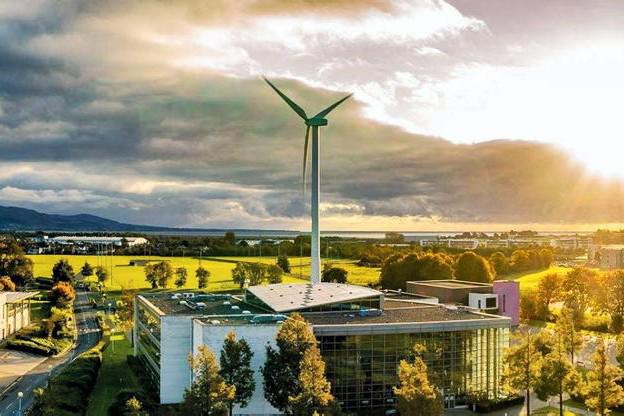
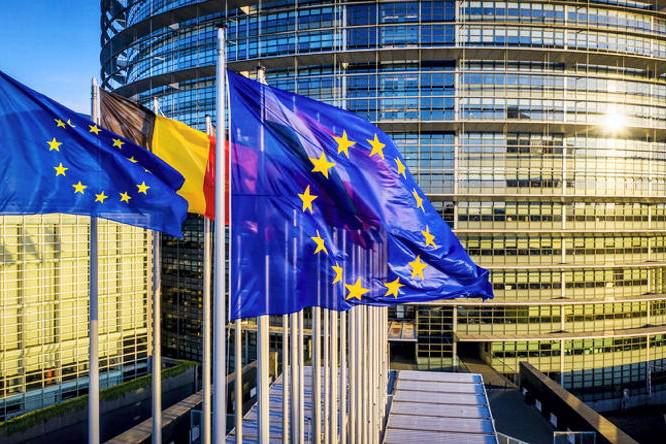
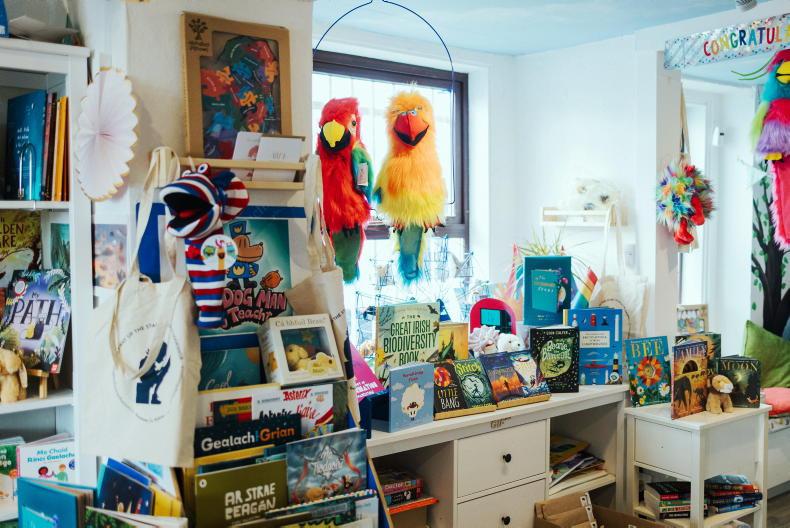

SHARING OPTIONS